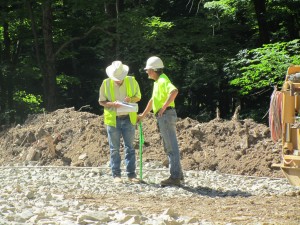New Study Cuts Estimated Marcellus Job Creation in Half

Kim Paynter / WHYY/Newsworks.org
Workers for the Linde Corporation prepare to lay pipe in Susquehanna County. The man in the cowboy hat is a "pipebender" from Texas and oversees the project.org
A new report by researchers at Penn State University and the Pennsylvania College of Technology says natural gas drilling in Pennsylvania’s Marcellus Shale created about 23,500 jobs in 2009. The results contradict an earlier study released by Penn State last year that credits Marcellus Shale drilling with creating about 44,000 new jobs in 2009.
The study says the Marcellus Shale generated about $3.1 billion dollars in economic activity, including $1.2 billion in labor income and about $1.9 billion in new economic activity for the state.
Timothy Kelsey, Penn State professor of agricultural economics, says the different numbers result from new information about how leaseholders are spending their bonus and royalty payments.
“These results are about half the size of those estimated in previous Marcellus economic impact studies,” Kelsey said. “But this isn’t surprising because we had more detailed information about leasing and royalty income.”
The researchers surveyed leaseholders in Bradford and Tioga counties. Kelsey says the data indicates leaseholders save more than half of their Marcellus Shale income. That means they spend less of it in the local economy, which results in less job creation than the previous Penn State study calculated. Kelsey says he believes his report is more accurate.
The jobs issue is contentious. The 2010 Penn State report was written by faculty in the Department of Energy and Mineral Engineering, and funded by industry groups. Critics have lambasted the industry-funded report as biased. The liberal-leaning Keystone Research Center released its own report in June that says the Marcellus Shale has created only about 10,000 jobs. That study looked specifically at new hires directly working for the gas industry. This most recent report includes ancillary jobs, as well as government jobs connected to the state’s gas drilling boom. The new study was funded by the state Department of Community Economic Development under former Governor Ed Rendell.
Kelsey says the DCED wanted an independent study on the economic benefits of Marcellus Shale. He says he was surprised by the amount of royalty income saved by leaseholders. The report also looked at the impact of out-of-state workers. A recent survey shows about 37 percent of Marcellus Shale workers are not permanent Pennsylvania residents. But Kelsey says their research found that didn’t make much difference in the level of local economic activity.
Kelsey says about 37 percent of Marcellus workers are out-of-state residents.
“The non-Pennsylvania workers living here, they might send income back to where they’re from, but a significant amount of money stays here,” said Kelsey. There’s a positive economic impact from them. It’s not the same size as if they were from Pennsylvania, but it’s not a huge difference.”
Kelsey and his team successfully surveyed about 300 local municipalities in drilling counties. For the small towns, it looks like Marcellus activity is a wash when it comes to revenues. Only 18 percent said they’ve received a boost in taxes, while about one-quarter said their costs have increased, mostly due to road repairs.
















